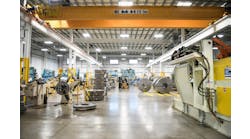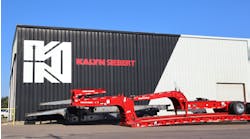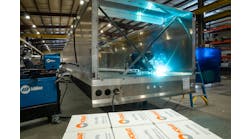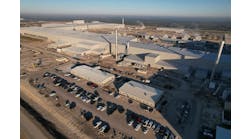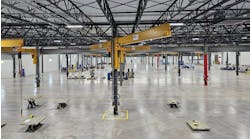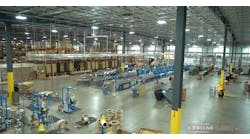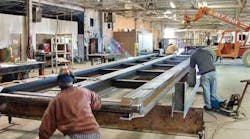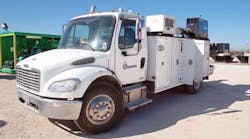Trailers have been the one constant in the life of Loadcraft Industries. Ownership has changed. The company isn't in Kansas anymore. But ever since its start in 1916, Loadcraft has been manufacturing trailers.
An extensive fabrication department and a veteran staff of engineers are helping Loadcraft sell trailers, drilling rigs, and concrete batch plants across the country and around the world.
“We have been able to meet changing needs,” says Greg Jordan, engineering manager “We have been quick to change. There was a time when we were manufacturing 17,000-18,000 container chassis a year. Now the oilfield is big again.”
The heavy-hauler market has been flat, management says, but the company has been busy producing frac chassis'. Frac chassis' ride on trailer axles and are towed by highway tractors, but they see most of their service at drilling sites. They are used for transporting the high pressure pumping equipment that is used while fracturing the formation that contains the oil or gas.
Loadcraft also produces its own custom chassis that either are mobile drilling rigs or are capable of transporting components of larger drilling rigs.
“Today's drilling industry is all about speed,” Jordan says. “How fast can you ‘trailerize’ a drilling rig? How quickly can it be dismantled and moved to another location? We have given a lot of thought to developing ways to do that.”
In addition to its line of trailers and dollies, Loadcraft designs and manufactures drilling and workover rigs with horsepower ratings of 250-2000 hp. The company also fabricates custom beams, and multi-axle components for heavy haulers and oilfield transporters.
“Nearly everything we build is mobile,” Jordan says.
Bouncing back from bankruptcy
Life hasn't always been rosy for the Brady, Texas, company. In 2004, Loadcraft was in bankruptcy. It had only four employees on the payroll 2004 and some work in process when Terry McIver came looking for a drilling rig. McIver, a farmer, rancher, and oilman, found the drilling rig among the work in process, but he also found potential in the bankrupt firm. Along with some partners, McIver bought the company and began breathing new life into it.
Employment had fallen to just two employees when the new Loadcraft began operations in November 2004. Since then, employment has grown to over 300 currently. The company has produced more than 800 trailers and commissioned more than 120 oil rigs. Prior to the downturn, the company was manufacturing 30 trailers, five oil rigs and 10 draw works (the part of the drilling rig that lifts pipe in and out of the well) per month.
Most recently, Loadcraft has acquired two other companies — one a trailer manufacturing company and another that manufactures a product that resembles a trailer.
One constant: heavy fabrication
Both of the newly acquired companies manufacture products that require heavy fabrication. Loadcraft acquired Liddell Trailers, a heavy haul trailer manufacturer founded in 1980 by Mitch Liddell. Loadcraft will retain the Liddell name, operating it as Loadcraft.
“Picking up the Liddell name expands our product line,” Jordan says. “Plus, we acquire their customer base, giving us customers that we have never had before.”
Management has not yet finalized its plans for where in Texas the Liddell line will be manufactured. That's because the other Loadcraft acquisition — R & S Manufacturing — has an excess of manufacturing capacity alongside the concrete batch plants that it currently produces. Much of the Liddell production probably will be performed in a redesigned R & S plant.
Loadcraft believes changes to the R & S production processes can lead to improved efficiency of its batch plant operation while carving out space for trailer production. However, Loadcraft believes it is close to winning a major contract for military trailers. If Loadcraft wins the contract, the space could be used to manufacture those trailers instead.
R & S Industries manufactures concrete batch plants and other specialized construction equipment.
“We didn't set out to get into the concrete batch plant business, but the opportunity came up to acquire a company with an excellent reputation and product line,” says Reece McIver, chief operating officer. “Their management will remain in place, and we will continue to manufacture their products.”
Expanding for the future
With the R & S acquisition, Loadcraft owns almost 400,000 square feet of manufacturing space on three sites. Company headquarters in Brady has approximately 250,000 square feet under roof and is located on 21 acres. The other two facilities are between 45 and 50 miles from Brady. Loadcraft's machine shop, the result of an acquisition in 2007, provides another 40,000 square feet of production area and some 40 acres on which to operate. The new R & S acquisition adds another 100,000 square feet and 12 acres.
The machine shop and the R&S facility are in Brownwood, Texas, in the adjoining town of Early. The distance between Brady and Brownwood may not be ideal, but Brownwood does offer some flexibility for the future. With the highway on the front and an airport at the back, Loadcraft essentially is landlocked in Brady. The two operations in the Brownwood area provide opportunities for expansion, both in terms of property and potential new employees.”
McCulloch County, where Brady is the county seat, has a population of 8,205, according to the 2000 census. By contrast, Brownwood alone has almost 20,000 people, and approximately 38,000 people live in the county. The larger population should make it easier to hire more employees as the economy recovers.
Knitting companies together
The product mix of trailers and oilfield equipment gives Loadcraft fabricating capabilities that would be hard to justify if the company only produced trailers.
“We are a highly integrated manufacturer,” McIver says. “If it makes sense for us to fabricate it ourselves, we will. As a result, we can meet customer needs in ways that some manufacturers may not be able to do.”
The 40,000-sq-ft machine shop in Brownwood produces a wide range of parts, including some for its trailer line. Lowbed and heavy-hauler trailers frequently require special pins, steerable axle components, and even trailer kingpins.
“Loadcraft of Brady is our best customer,” says Clois Montague, operations manager at the Loadcraft machine shop in Brownwood.
The shop process flat stock, round, and structural steel. Because of the loads placed on oilfield equipment, the Loadcraft machine shop responds with heavy-duty equipment of its own. For example, the ESAB cutting table can handle inch-thick steel when it is equipped with its 500-amp plasma. It cuts cut 5 ½“ steel when using oxy-fuel.
“The manufacturer says it will cut five-inch steel, but we know from experience that it will do 5 ½,“ Montague says.
The machine shop is housed in a building that had been producing bricks until Loadcraft bought it. Besides the obvious need to remove the kiln, one of the biggest changes Loadcraft made to the building was in the foundation. In order to support the horizontal machining centers and other heavy machine tools, Loadcraft tore out the existing slab and poured a foundation that is a minimum of 14 inches thick. The foundation is up to 28 inches thick where additional support is required.
Lengthy history
Loadcraft traces its history back to 1916 when Fred Spencer began building pole trailers for use in the oilfields of Kansas. Over time, the company developed more than 50 different types of trailers for oilfield applications.
In the early 1960s, Loadcraft moved to Brady. For a brief period, the company operated in both states before dropping roots exclusively in Texas.
“Loadcraft has had several owners over the course of its history,” McIver says.
While starting out in the oilfield, the company has branched out into other markets that need to move heavy loads. One of the heaviest — a trailer for moving a 600-ton load for nuclear reactors.
Throughout its history, Loadcraft has specialized in specialty trailers.
“Container chassis are about the only repetitive product that has ever built here,” says Ray Jones, vice-president of trailer operations.
Like most trailer manufacturers, 2009 was a difficult year, but Loadcraft is gearing up for additional production in the coming months.
“We have hired 18 new employees this month,” Jones said. “We see good things ahead.”
